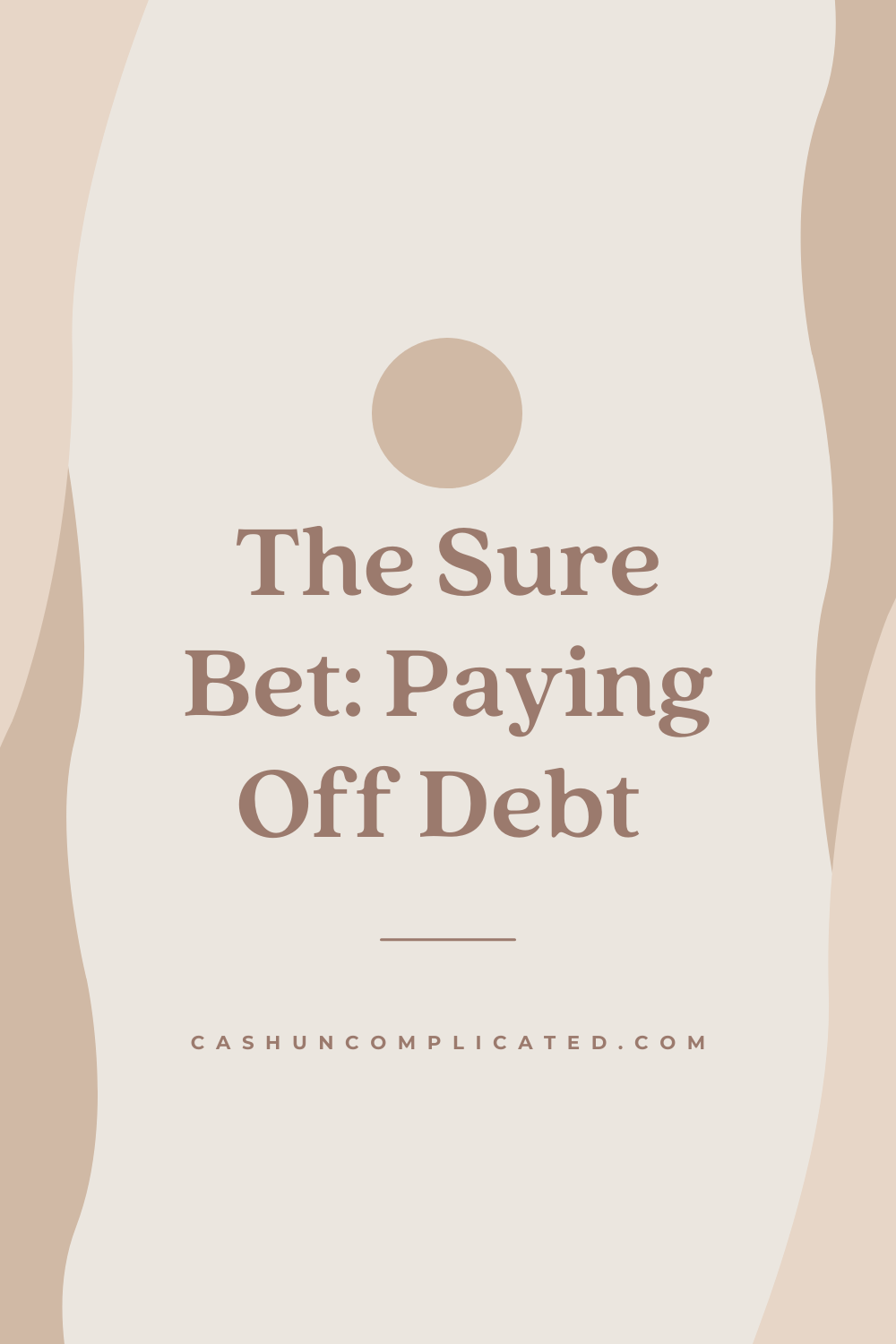I’ve always been big into sports. Playing sports, watching sports, and getting regular exercise. My friends laugh at me because I’ve got a sports analogy for everything. No matter what the subject, I can come up with a sports analogy.
Personal finance is a lot like sports. Maybe that’s why I’m so passionate about both of them. So when someone asks the question of how to get good luck with money, my mind quickly shifts to sports for a good analogy.
Ask any sports fan, and they’ll tell you that certain teams just seem to create their own luck. The baseball team with players who run the bases hard create more throwing errors from the outfielders.
The basketball team whose players dive for loose balls, sprint down the court, and “box out” on defense seem to catch the lucky breaks and get more fouls called on the other team.
The wide receiver in football who runs fast, crisp routes draws more pass interference penalties on the defense, and makes the circus catches for big gains.
Predictable Results
In reality, I don’t see these things as luck. I see them as predictable results of playing hard, adhering to the fundamentals, and following a game plan. These results can look like luck, but there’s no fluke in getting positive results from working hard and efficiently.
Just like in sports, I think you can create a disproportionate amount of positive results in personal finance by following core principles. Following the principles below are how to get good luck with money–and anyone can do it.
Principle #1: Belief
Before all the nuts and bolts of personal finance comes mindset. You have to believe that you can be good with money. If you don’t believe it, it’s probably not going to happen. This is such an important concept that I begin my book Cash Uncomplicated with this concept.
I used to believe that I would never be good with money, have money, or have any luck with money. This was a faulty mindset, and the primary reason I wasn’t financially successful. When I thought about how to get good luck with money, I thought you had to win the lottery or get lucky somehow.
My mindset was way off kilter and as a result, so were my personal finances. Once I eliminated the old thoughts and started to believe, I began to get good luck with money. And good things started to happen for me both financially and personally.
Abundance Mindset
A sub-category of belief is having the abundance mindset. The abundance mindset is a set of beliefs that:
- Things will work out
- There’s enough to go around
- It’s possible to create win-win situations
- Opportunities abound
- And much more
Switching from a scarcity mindset to an abundance mindset made a massive difference for me. It was enlightening to learn that creative solutions can be developed to create win-win situations and more than one person can win by offering value in any given situation.
Principle #2: Avoid Consumer Debt
Consumer debt like credit cards, store credit, and car payments puts us into a hole at the start of each month. Before anything good or bad has a chance to happen for the month, those with a car payment are already facing a $200+ payment. Oftentimes closer to $500 or $600 for a more expensive car.
Those in credit card debt face the uphill battle of outrageous interest rates, fees, and minimum payments just to stay afloat. Same for those who have taken out store credit.
If you’re in consumer debt, the majority of your money is going straight to debt payoff. There’s not a lot for your money to do other than pay off debt. And for those just paying the minimum, it’s really just treading water.
Debt is a cycle that can take years to get out of. When people are in debt, the two main focuses are avoiding further debt, and paying off the current debts. It’s all about getting back to $0, and it’s a big fight just to get there.
There are not a lot of financial growth opportunities for those in consumer debt. The faster you can get out of consumer debt, the faster you’ll create new opportunities.
Principle #3: Automate Your Savings and Investments
Great things happen when you automate your savings and investments. It sounds boring to just keep contributing monthly to your investment and savings accounts, but that consistency puts you in a superior position to succeed. Some would call that luck, I call it smart.
Let’s use an example on the investment side. If you are contributing a set amount of money each month to an index fund, and the stock market goes up, you are there to capture those gains because you’re already in the market.
Some may call it luck when the market surges. What those people aren’t seeing is that you have consistently been putting money into the market for years on end, perfectly positioning yourself to capture gains.
The same thing goes for real estate and other investments. If you put money into the purchase of a house or an investment property, and the real estate market appreciates, you are there to reap the benefits. You put yourself in a position to succeed and catch the lucky breaks by consistently investing your money every month.
Principle #4: Buy Assets
If you’ve read Robert Kiyosaki’s Rich Dad Poor Dad, you know one the main themes from the book is to buy assets, not liabilities. Most people go to a job, get a paycheck, and buy things with that money. Kiyosaki flips the paradigm to buying assets that will then help you purchase liabilities.
Here’s an example: the majority of people use the money from their paycheck to purchase a vehicle. That car requires gas, maintenance, repairs, new tires, etc. It costs money to drive–so it’s a liability. Or in other words, taking money out of your pocket.
Instead of purchasing the car and using your own money for the costs of the vehicle, purchase an asset first. Then use the money from that asset to purchase the vehicle and pay for the subsequent costs. Or make the vehicle an asset by renting it out on an app like Turo.
Principle #5: Play the Investing Long Game
Investing and building wealth is not buy stocks or real estate for six months and get rich within the year. Sure, you may have read or seen this happen for someone–but for the most part it takes time to build wealth. Very rarely is it an overnight occurrence.
Playing the long game of investing is how to get good luck with money because it gives you the gift of time. Not only time to compound, but time to make mistakes, and for the market to correct itself.
Imagine someone in the real estate or stock market for a 20 to 30-year time period or more. During that time there are ups and downs in the market, highs and lows, fluctuations, or whatever you want to call it. The person who keeps their money in the market can absorb the lows and benefit from the highs. Speculation and panic is not necessary under this model.
How to get good luck with money? Simply play the long game and stay in the market, and allow time to work for you instead of creating an unnecessary urgency.
Principle #6: Have a Vision and Set Goals
Principle number six of how to get good luck with money is to have a vision and set goals. Without a vision and goals, there is no roadmap. This analogy has been used before, but it’s fitting.
If you were going on a road trip from Los Angeles to New York City, you wouldn’t just start driving. You need to map out a route (GPS counts!) that is going to take you northeast toward New York City. If you just start driving you’d have no idea where you are going and might end up in Canada, Mexico or somewhere in the middle of the country.
Money is no different–have a vision and set goals on how you’re going to earn money, why you want a specific amount of money, and what you plan on doing with the money. Then it becomes real, and your brain is empowered to begin executing the plan. As you work harder and smarter, you will naturally catch some lucky breaks.
You’ll have money in the market when there’s a good day or week, be in line for the promotion you’ve been working toward, have the ability to start your own business, or whatever else you want to do. It all starts with a vision and goals.
Principle #7: Be a Value-Based Spender
Value-based-spending means being intentional with your money and only spending on things you really value. This mindset almost completely eliminates wasteful spending. In turn, you have more money to purchase what you really want, and to save and invest more.
As an example, suppose you really love to travel. You rank travel as one of your highest values so you save monthly for future trips. You’ve got an account set up just for travel and have the money ready to go.
You find a special promotion to Hawaii–flight and resort for half the price. You’ve already got the money so you book the trip. Your friends and family comment “how lucky you are” but you know that you set yourself up to take advantage of that special promotion. Without the work you put into saving, there is no trip and no “luck.”
Principle #8: Have a Reserve Account
Not having money for an unexpected bill is very stressful. Most of us have probably woken up in the middle of the night wondering how we are going to pay for something that broke. Fortunately, we all can take action to prevent 99 percent of that worrying from happening.
Suppose “Sarah” automatically contributes a set amount of money each month to her reserve account. If something goes wrong that month like a $300 car repair, she simply takes the money from her account and pays the bill. Almost no impact on her life. No crisis, no worry, just take the money from the account and pay it off.
A reserve account buys you peace of mind and puts you in a position of financial strength. That will free you up to focus on the important things. Like spending more time with your family, starting a business, or going for that promotion at work. When you focus like this, opportunities often arise.
Someone looking for opportunities to start a business are open to new ideas and to meeting like-minded people. Those kinds of activities create opportunity and luck. People bogged down with financial worries usually aren’t out there looking for new opportunities. It’s hard to create luck if you’re worried about the next bill.
Related:
How Much of an Emergency Fund Should You Really Have?
The Broken Down Car and the Emergency Fund
Principle #9: Track Progress
Number nine on the list of how to get good luck with money is to track your progress. Peter Drucker said: “What gets measured gets managed.” Measuring is another way to say tracking.
Tracking your progress does a few things. Number one, it is a way to continuously assess where you are in relation to your goal. Which allows you to make adjustments, create new strategies, and pivot as necessary. The method to reaching your goals is not stagnant–innovation and creativity are required.
Secondly, and arguably more importantly–tracking keeps the goal at the forefront of your mind. That tells you to keep going and keep pushing. It’s something to look at every day and find solutions to reach the goal you have set.
Reticular Activating System
This activates your reticular activating system (RAS), something I write about extensively in my book. As a basic definition, the reticular activating system is your brain recognizing things that are at the front of your mind. For example, if you are looking to purchase a SUV, you will start to notice more SUV’s on the road. It’s not that there are suddenly more SUV’s you are just noticing them more.
Similarly, when you track your progress, the item you are tracking is at the forefront of your mind–so you pay more attention to it. And when we pay more attention to something, we are more likely to put more action and energy into it.
Principle #10: Personal Development and “Becoming”
Personal development is one of the most important things anyone can do to improve their lives. Not just in personal finance–but in all areas including fitness, relationships, business, and much more. Personal development is about becoming.
When asked about becoming a millionaire, Jim Rohn said: “Become a millionaire not for the million dollars, but for what it will make of you to achieve it.”The power is in the process of becoming, and the end results will take care of themselves.
As you become better, luck has a way of finding you. New opportunities will arise, and more opportunities will arise from those opportunities. The cycle of opportunity continues because you have put yourself in the position to create and receive those gifts.
Principle #11: Give
Giving helps create abundance. Number one, you are doing something nice for someone else (charity, individual person, etc) by providing financial support. Number two, the act of giving delivers the message to yourself that you have plenty and there is enough to go around.
It creates a confidence that you will be able to earn more and give more, and continue the cycle of giving and abundance. This is opposed to the scarcity mindset that says what you have is yours–and once you give, it’s gone forever.
I’ve heard many people speak about this so I think it has merit. The message I hear is that when you give, it comes back to you in greater abundance. This isn’t to say that you should give just in hopes of getting something in return–but giving does seem to have a way of creating luck.
Principle #12 : Gratitude
Last, but not least is gratitude. Be thankful for what you do have and don’t dwell on what you do not have. If you are reading this post, you have a lot of reasons to be grateful. And no, not because I’m such a great writer…
If you are reading this post, it means number one, you have the ability to read–something not everyone in the world has the ability to do. Secondly, you are likely reading on your phone or computer–which means you have a phone or computer. There are millions of people in the world who do not have access to either.
So think about life’s blessings and show gratitude. Chances are you have a lot to be thankful for that you haven’t thought about before.
Conclusion
How to get good luck with money? Try following these principles to start. The word luck is often interpreted as a random occurrence seemingly out of nowhere. I don’t think this is an accurate interpretation of the word.
I’ve found that in the majority of cases, luck is created by following timeless principles like working hard, setting goals, practicing gratitude, and the other principles written about in this post. Following the principles creates new opportunities–and with new opportunities often comes luck.
Very few people create luck by sitting on the couch watching TV and eating chips. Luck comes to the doers and the action-takers. Not just luck with money, but in all areas of life.
What financial principles do you follow to create your own luck?












